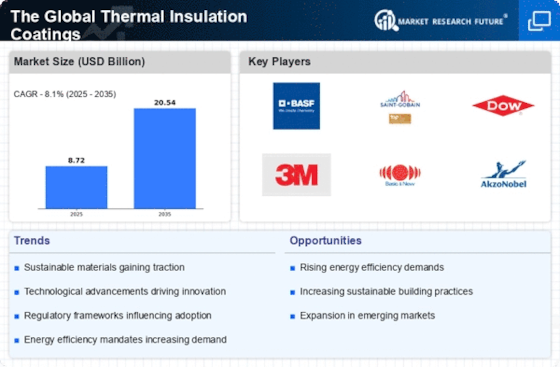Top Industry Leaders in the Thermal Insulation Coating Market
 The global thermal insulation coatings market is a dynamic space brimming with competition. Players vie for market share, employing diverse strategies and grappling with evolving factors.
The global thermal insulation coatings market is a dynamic space brimming with competition. Players vie for market share, employing diverse strategies and grappling with evolving factors.
Market Share Strategies:
-
Product Diversification: Leading players like AkzoNobel, Dow, Jotun, Nippon Paint, and PPG Industries are constantly expanding their portfolios. They offer coatings for various temperature ranges, substrates, and applications, catering to diverse niche markets. -
Technological Innovation: The focus is on developing high-performance, sustainable, and cost-effective coatings. Research into nanotechnology, bio-based materials, and self-healing properties is shaping the next generation of thermal insulation solutions. -
Geographical Expansion: Emerging economies like China, India, and Brazil are witnessing a surge in construction and industrial activities, presenting lucrative opportunities. Companies are establishing manufacturing facilities and distribution networks in these regions. -
Brand Recognition and Marketing: Building strong brand identities and targeted marketing campaigns are crucial. Players leverage digital platforms, industry collaborations, and participation in trade shows to reach new customers and solidify their presence. -
Strategic Partnerships and Acquisitions: Mergers and acquisitions are on the rise, aimed at consolidating market positions, acquiring expertise, and expanding product offerings. Recent examples include Sherwin-Williams' acquisition of Valspar and Axalta Coating Systems' purchase of Crown Industrial Products.
Factors Influencing Market Share:
-
End-Use Industry Trends: Growth in the building & construction, marine, aerospace, and automotive sectors directly impacts the demand for thermal insulation coatings. Rising urbanization and stringent energy efficiency regulations in developed countries are key drivers. -
Raw Material Pricing and Availability: Volatility in the prices of key raw materials like epoxy resins and acrylics can affect production costs and product pricing, impacting market competitiveness. -
Environmental Regulations and Sustainability Concerns: Stricter environmental regulations are driving the development of eco-friendly, low-VOC, and bio-based thermal insulation coatings, creating new market opportunities for innovative players. -
Regional Economic Growth: The economic growth of emerging economies fuels infrastructure development and industrial expansion, leading to increased demand for thermal insulation coatings in these regions. -
Technological Advancements: Development of advanced application techniques like spray and robotic coating is making application faster and more efficient, lowering costs and boosting market adoption.
Key Players
Some of the prominent players operating in the Global Thermal Insulation Coating Market are PPG Industries, Inc. (U.S.), The Sherwin-Williams Company (U.S.), The Dow Chemical Company (U.S.), Akzo Nobel N.V. (the Netherlands), Kansai Paint Co., Ltd. (Japan), Jotun (Norway), Nippon Paint Holdings Co., Ltd. (Japan), Carboline Company (U.S.), Sharpshell Industrial Solutions (South Africa), and Mascoat (U.S.), among others.
Recent Developments:
September 2023: PPG Industries announces plans to expand its manufacturing capacity for thermal insulation coatings in China to cater to the growing demand in the region.
October 2023: The International Maritime Organization (IMO) adopts stricter energy efficiency regulations for ships, creating a strong demand for marine-grade thermal insulation coatings.
December 2023: AkzoNobel unveils a collaborative research project with a leading university to develop next-generation, self-healing thermal insulation coatings.










